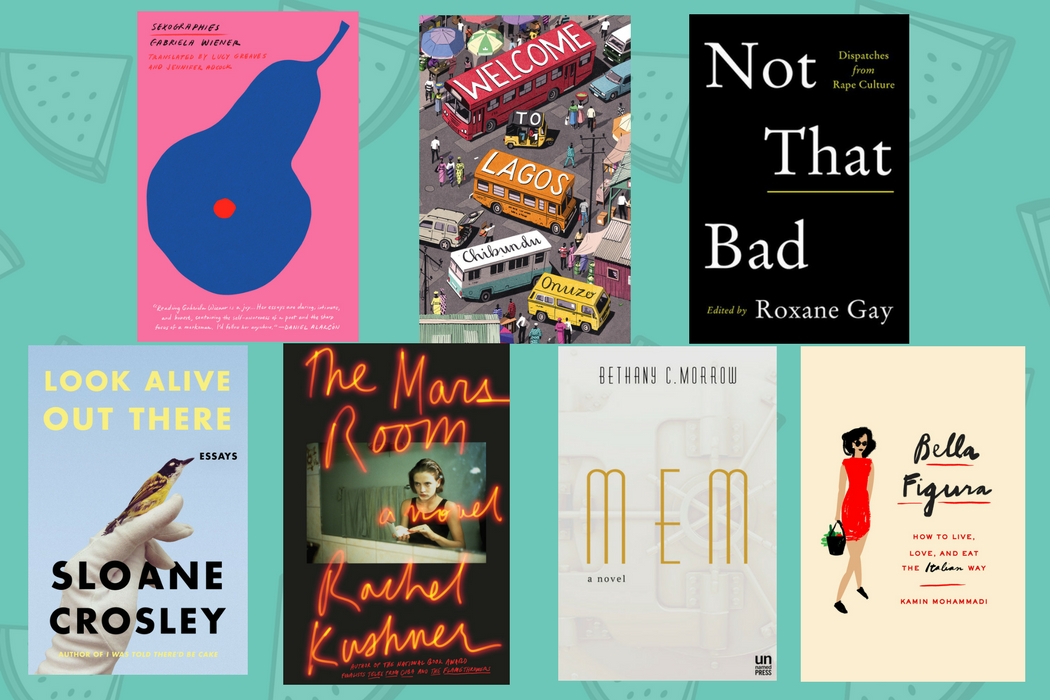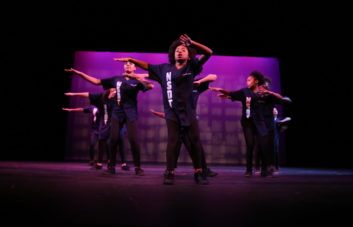Living like an Italian, a prison noir, and new essay collections to check out this month.
By Jordan Bascom, Daley Farr, Annie Metcalf, Kaylen Ralph, Samantha Rose, Marit Swanson, and Sarah Waller
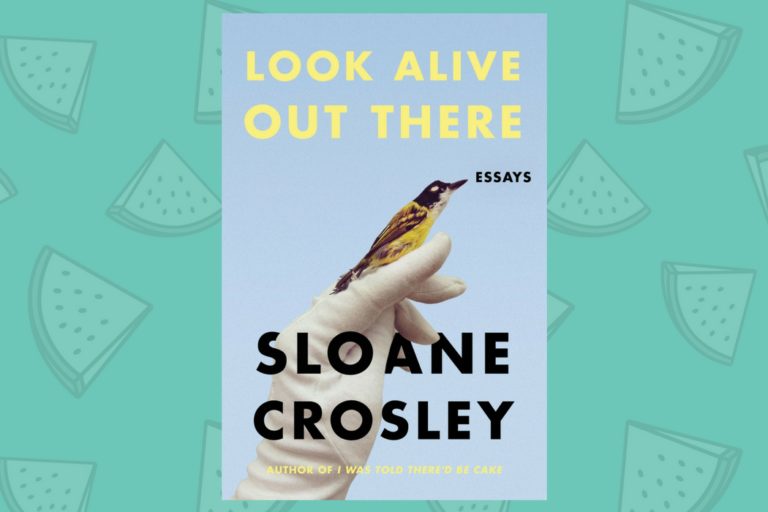
“Look Alive Out There: Essays” by Sloane Crosley
MCD
Out: 4/3/2018
I finished Sloane Crosley’s latest collection of essays, “Look Alive Out There,” while I in the waiting area of my neighborhood Jiffy Lube. I started the book’s concluding essay “The Doctor is a Woman,” in which Crosley recounts reckoning with her infertility, and deciding to freeze her eggs, as soon as I sat down with my Styrofoam cup of coffee.
Crying in Jiffy Lube, which is what I was doing by the time I had finished this particular essay, is a theatrical metaphor for this entire collection—funny, sure (it’s Jiffy Lube!) but actually kind of sad. In “The Doctor is a Woman,” Crosley recounts the horror of realizing she had accidentally frozen the $1,500 worth of drugs she needed prior to having her eggs harvested, only after having attempted to acquire some nearly expired drugs via the “black market,” at least a very Upper West Side version of the black market, anyway.
In this collection, Crosley builds upon her trademark style—one of dry wit peppered with hilarious asides—to tackle topics that are actually not all that funny: death, aging, the fickle nature of relevancy, chronic illness and, of course, fertility.
Fans of her earlier collections, “I Was Told There’d Be Cake” and “How Did You Get This Number,” will find comfort in Crosley’s ability to lend her consistent style to the topics we’re all a little afraid to touch.
—Kaylen Ralph
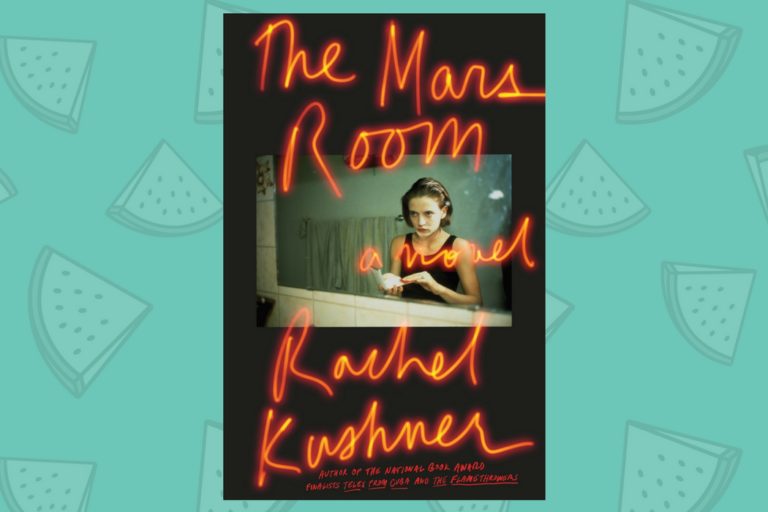
“The Mars Room” by Rachel Kushner
Scribner
Out: 5/1/2018
“The Mars Room” by Rachel Kushner is a dizzying noir set in a California prison during the early aughts. Romy Hall is staring down two life sentences for murdering her stalker. As she copes with the quotidian indignities of prison life—the unceremonious brutality, lack of privacy and Kafkaesque bureaucracy—she reflects on her upbringing and the life she led prior to arrest. It was a life of inescapable poverty punctuated by drugs and sex work and casual violence, a life propelled by inequitable forces. As the incarcerated protagonist mulls over the events of her life, the story flits back and forth to San Francisco in the waning decades of the twentieth century.
The characters in Kushner’s work dance in and out over the flash of a few sentences, their lives distilled to jarring anecdotes and images that bolster the seedy undercurrents in the novel’s world. As much about San Francisco in the ’90s as it is about prison, the novel crackles with a sordid, claustrophobic atmosphere in which the city looms omnipresent and labyrinthian, a backdrop filled with pockets of skeeviness and clusters of crime. “The Mars Room” excels in presenting a complete universe, one that is brimming with life and stories, and Kushner expertly captures the nuances of a cultural scene on the cusp.
While illustrating the horrors of poverty and prison life, the novel never encroaches didacticism in the way that many books about Big Issues do. An elegantly crafted story that animates vital, difficult topics, “The Mars Room” is a harrowing read about survival in the face of injustice.
—Jordan Bascom
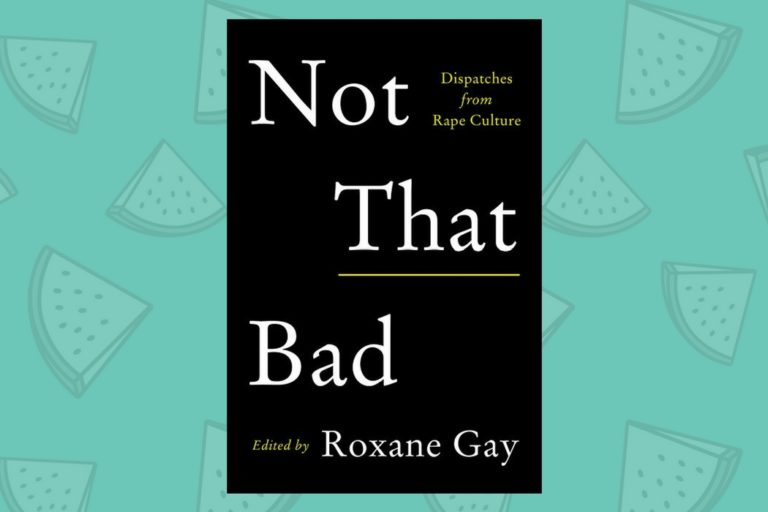
“Not That Bad: Dispatches from Rape Culture” edited by Roxane Gay
Harper
Out: 5/1/2018
“Not that bad.” This is the notion the essayists of “Not That Bad: Dispatches from Rape Culture,” an anthology edited by Roxane Gay, try to refute as they demonstrate how deeply ingrained rape culture is in our everyday lives and how far its reach extends. The stories within the anthology differ vastly, as do their storytellers, but all of them work to create a broader picture of a society ravaged by a culture that tacitly endorses and encourages rape. This book seeks out the complexities of rape and confronts them; its variety of subject matter and approach does important work to end the pervasive stereotypes of who we identify as survivors, victims and rapists.
“Not That Bad” feels like a communion of authors, in particular women, trans and non-binary persons, able to let go and tell their stories with the full extent of the rage that rightfully accompanies them. The collection ends with a standout essay by “The Rumpus’” “Funny Women” editor Elissa Bassist entitled “Why I Didn’t Say No.” Explaining her thought process through an ever-escalating series of “Because…” statements, it drives home the point of the collection: that when you live in a rape culture, when your thoughts are constantly influenced by a culture that devalues your humanity, you assimilate these thoughts into your own, eventually minimizing the impact of your experiences until you’re left saying to yourself “it wasn’t that bad.”
—Samantha Rose
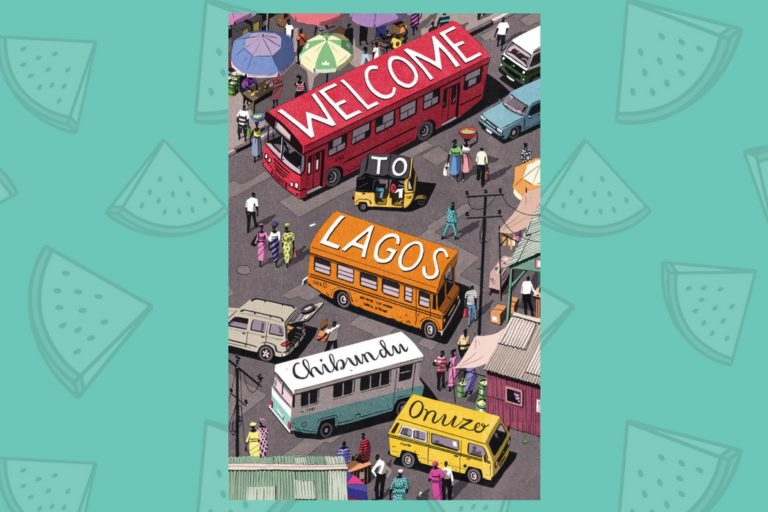
“Welcome to Lagos” by Chibundu Onuzo
Catapult Books
Out: 5/1/18
Lagos-born Londoner Chibundu Onuzo makes her debut in the United States with “Welcome to Lagos,” her second book. This is the vibrant work of a young novelist, incorporating religion, journalism, politics and fable-like storytelling into a whirlwind tale about finding trust and a sense of home.
“Welcome to Lagos” follows an unlikely band of antiheroes––two deserting soldiers, a young militant, a traditional housewife, a withdrawn teenage girl, a principled newspaperman and a disgraced politician––each seeking a new life in Lagos, the city that “would kill you if you wasted time on yesterday.” Onuzo’s story is propelled by short, punchy chapters, full of page-turning twists, while the characters are best understood collectively, standing in for the country at large. Still, they are written with knowing tenderness; their motivations, their skepticism and their eventual affection for each other feel real. Onuzo carefully approaches her characters’ distinct experiences of violence without robbing them of their agency and humor.
Onuzo also works as a journalist, and her writing is especially sharp when confronting present-day colonial attitudes in the press. One of the book’s finest sections is when a BBC television journalist rushes to Lagos, eager to put his personal spin on a story that more rigorous reporters already broke––smug missteps and racist blunders abound. The episode is wickedly funny but cutting, pointedly deconstructing the paternalistic narratives which saturate Western media.
Ultimately, Onuzo crafts “Welcome to Lagos” as a novel that manages to be both savvy and heartfelt, a hopeful testament to human connection and unlikely redemption. As army officer Chike muses, “There was a new life waiting for him in Lagos. He would make his way. . .Who would he be in this new city?”
—Daley Farr

“Bella Figura: How to Live, Love, and Eat the Italian Way” by Kamin Mohammadi
Knopf
Out: 5/8/2018
Iranian-born journalist Kamin Mohammadi appeared to have the perfect life as a successful magazine editor in London. But after significant heartbreak, her loneliness and battered mental and physical health drove her to accept the offer of a friend’s apartment in Florence, Italy. What appears to be a simple getaway to work on writing a book becomes a vibrant year of learning the Italian way of life—“la bella figura”—which one of her first new friends and confidants reveals as more than just being the most beautiful you can be, but “more about taking care, of speaking beautiful words, being beautiful to yourself, even in private.”
For Mohammadi, the months become a chronicle of learning self love, from fashion to skincare to walking everywhere, food as a way of life and community, and learning to live at a slower pace. What begins as envy of her Italian neighbors and friends becomes her own journey of self-discovery. The readers follow along on this journey of her learning the simple steps Italians take to appreciate life, by exploring the city’s many restaurants, shopping daily for fresh food at the market, making simple, mouth-watering recipes, and the art of espresso and aperitivo, pre-dinner drinks.
This memoir becomes a powerful depiction of a woman taking control of her own life and learning from her mistakes. In the end, “la bella figura” is simpler than its allure would have one believe, and Mohammadi offers tips at the end of the book for incorporating its magic into one’s own life. Charming, seductive, and informative, “La Bella Figura” is a modern-day memoir and self-help hybrid with a compelling reminder to slow down.
—Sarah Waller
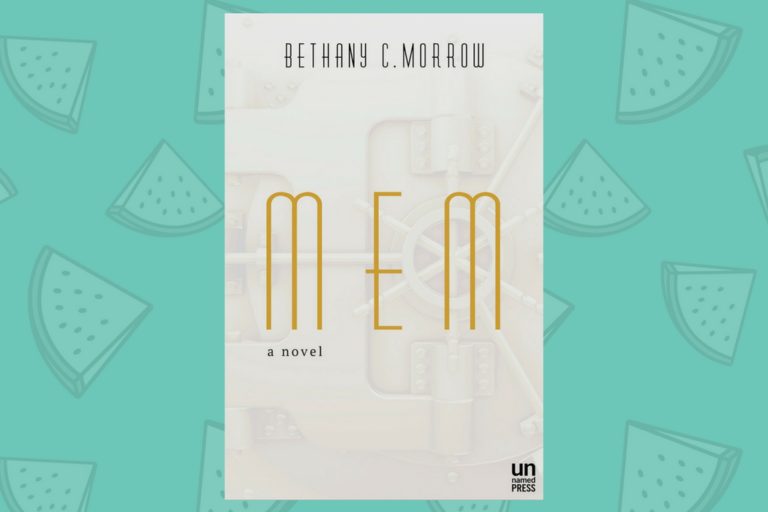
“MEM” by Bethany C. Morrow
Unnamed Press
Out: 5/22/2018
Bethany C. Morrow’s debut novel “Mem” opens in Montreal, 1925. Elsie, otherwise known as Dolores Extract #1, takes a last look around her beloved apartment before departing—she must return to the Vault where regular Mems are stored. Like any Mem, Elsie looks identical to her source, a then-young woman named Dolores, and was created to house a traumatic memory that was medically removed from Dolores’s mind. But in stark contrast to all other Mems, Elsie talks, laughs, feels, learns and interacts with the world as if she were human. When the professor who invented the memory extraction procedure discovered Elsie’s unique nature, he was able to arrange for her freedom—until now. For Elsie is still Dolores Extract #1, the legal property of her source. Unless she can prove that she is fundamentally different from other Mems, Elsie as she knows herself will be no more.
“Mem” weaves together interesting questions about the rights of non-human creatures, the unexpected consequences of new medical technologies, and the relationship between memory and identity. These ideas are certainly not new—the plot is very much a lovechild of the HBO show “Westworld” and the 2004 film “The Eternal Sunshine of the Spotless Mind”—but Morrow addresses them thoughtfully, if not subtly. While the structure of the novel is overly convoluted and the historical setting feels forced, Morrow’s voice is strong enough to rise above the white noise of art-deco details. Especially near the end, moments of insight expressed with authentic prose mark Morrow as a writer to watch.
—Marit Swanson
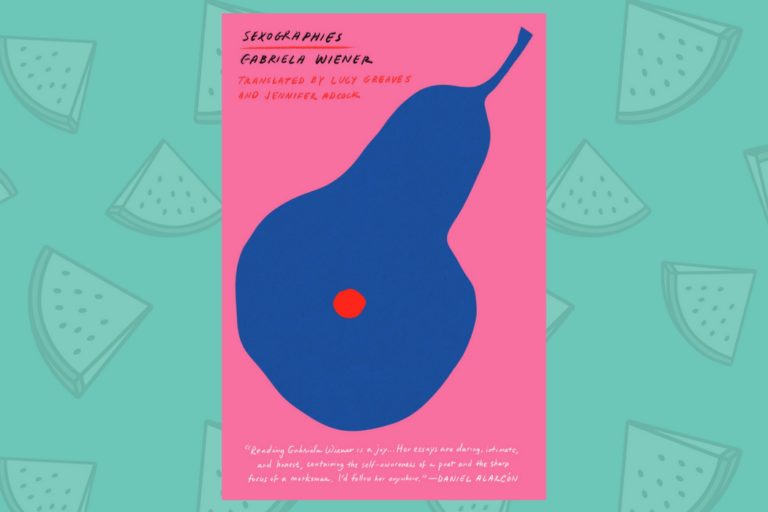
“Sexographies” by Gabriela Wiener, translated from the Spanish by Lucy Greaves and Jennifer Adcock
Restless Books
Out: 5/29/2018
In her collection of essays on unconventional sex and other mysterious corners of existence, Peruvian journalist Gabriela Wiener reveals the familiar in the unexpected. Weiner’s explorations—into the complex process of egg donation in Europe, the multifaceted community of Latin American transvestite prostitutes in Paris, or the adventure of attending a swinger’s club with one’s partner—marry the investigative with the personal. Wiener’s life experiences, insecurities, humor, and curiosity elevate the pieces from voyeurism of fringe sexuality to respectful, even moving, slices of life. In a particularly powerful essay called “Three,” Gabriela relates her experience in a polyamorous throuple with her husband and a friend, and in a few short pages conveys the complex effects the arrangement had on their emotions, gender roles, and relationships.
With a voice that’s both skeptical and enthusiastic, Gabriela manages to walk a fine line between journalistic professional and charming tour guide. She liberally applies self-deprecation and sly humor throughout, building a bridge between the journalistic, academic moments and the visceral, titillating ones. Despite its title, and its fascinating glimpses into different expressions of sexuality, “Sexographies” is about much more than sex; it is about our bodies and all that happens inside them—sex, yes, but also love, fear, intoxication, insecurity, parenthood, and death. A fierce, funny and beautiful collection that will spice up the summer nonfiction shelf.
—Annie Metcalf


